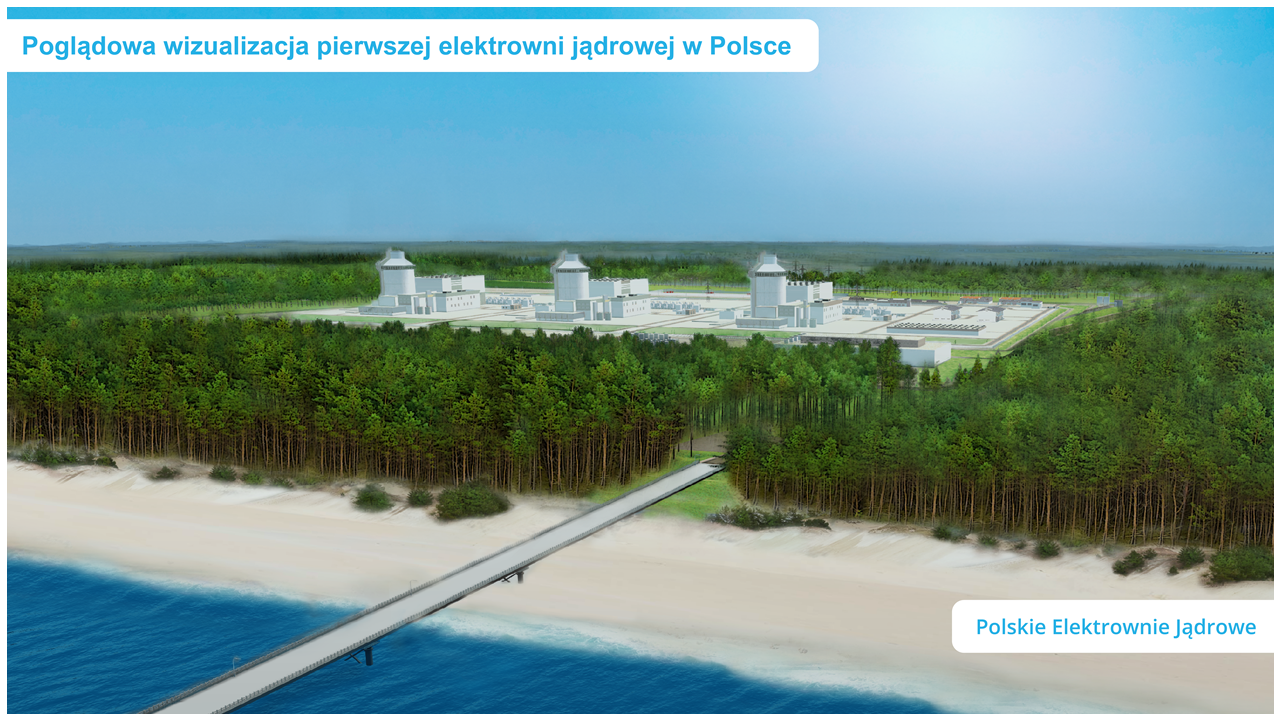By 2028, a jetty will be built for the construction of the nuclear power plant in Pomerania
It will cost about PLN 900 million. On Tuesday the government adopted a resolution on establishing a program to support infrastructure investments in the Pomerania province, including for the needs of the nuclear power plant. More than PLN 4.7 billion has been allocated for the implementation of the program in 2023-2029.
“Some of the investments accompanying the future construction of the first nuclear power plant are already being prepared. Thanks to the program, we have secured funding for these investments from the state budget,” said Anna Łukaszewska-Trzeciakowska, the Government Plenipotentiary for Strategic Energy Infrastructure.
She said the program provides for the construction of a special jetty that will be about 1100 meters long. Construction is expected to be completed in 2028. She stated that the investment cost was slightly over PLN 900 million. She explained that the jetty will be used to build the first nuclear power plant in Pomerania.
“Ships with large elements for the construction of the NPP will be docking there. The jetty will not be dismantled once the plant is built. It will be used for the exploitation of the plant and as, e.g. a smaller port for ships to promote tourism in the region,” she said.
She added that the possibility of using the structure for the construction and maintenance of offshore wind farms is also being analyzed.
As she noted, the program also provides that the necessary railway infrastructure in Pomerania will be expanded for almost PLN 3 billion. Earlier it had been said that this would involve the reconstruction or construction of railway infrastructure that will provide access to the following districts:Nowa Wieś Lęborska, Lębork, Wicko, Łeba, Wejherowo, Choczewo, Gniewino i Krokowa, including railway lines together with the overhead line, passenger stations, freight terminals and engineering facilities.
Łukaszewska-Trzeciakowska also confirmed that in connection with the construction of a nuclear power plant, for approx. PLN 1 billion, road infrastructure is to be expanded as well. It is about building a national road that provides access to the nuclear power plant in the area of the municipalities of Choczewo or Gniewino and Krokowa from the nearest expressway.
The Plenipotentiary has also said that the investments accompanying the nuclear power plant also include the necessary energy infrastructure. She explained that it was about rebuilding the grid to allow it to independently get power from future power plants and offshore wind farms.
Łukaszewska-Trzeciakowska added that the road and rail component provided for by the program is to be-as planned-fully ready in 2029.
Polish Press Agency / Bartosz Siemieniuk / Jacek Perzyński
Polimery Police investment launches. This is the largest project of Grupa Azoty in history
The Polimery Police Project, a plant for the production of polypropylene, begins work today. 800 people will be employed there. It is one of the largest chemical plants in Europe.
On Thursday, June 22, the production of polypropylene in the new factory of Grupa Azoty-Polimery Police will start. It is the largest investment of the Polish chemical industry and one of the largest in Europe. It cost USD 1.8 billion.
The Polimery Police plant is designed to reduce the dependence of the company and the country on the supply of chemical compounds from abroad. This is the largest investment in this sector of the Polish industry in years.
The Polimery Police Project comprises an integrated chemical complex comprising a propylene production plant, a polypropylene production plant, a transhipment and storage terminal, logistics infrastructure and ancillary facilities.
The terminal will enable the supply of two key raw materials for the investment – propane and ethylene. The gas terminal in Police has three tanks, two for propane with a capacity of 40 tcm each and one for ethylene with a capacity of 12 tcm.
The plant will produce polypropylene. It is a chemical that is used for the production of household appliances, medical equipment, syringes, wires or car parts. The Police plant will be one of the largest chemical plants in Europe and probably the largest such plant producing polypropylene.
Grupa Azoty is the largest producer of fertilizers in Poland and one of the key capital groups of the fertilizer and chemical industry in Europe.
Grupa Azoty / Jacek Perzyński
Poland’s former Climate Minister will help to plan the reconstruction and energy transition of Ukraine
During the Ukraine Recovery Conference, which took place in London on 21-22 June 2023, a High-Level Advisory Group on Ukraine’s National Climate and Energy Plan (KPEiK).
The group is composed of representatives of the government of Ukraine, the Energy Community Secretariat, members of the G7+ and international partners such as the EBRD, the EIB, USAiD, the World Bank, UNDP and the DFC.
The KPEiK is a key reference document for Ukraine’s reconstruction and sets out priorities for environmental reforms, based on EU energy and climate management standards, the Paris Agreement and decarbonisation goals. It aims to unlock Ukraine’s potential to develop a modern, decentralised energy system based on renewable energy.
The High-Level Advisory Group, chaired by Yulia Swyrydenko and Michał Kurtyka (former Minister of Climate of the Republic of Poland), will act as a strategic advisory, supporting the Ukrainian authorities in the preparation and consultation of the KPEiK. The group will also coordinate technical work and provide a consultative platform for international partners willing to engage and support Ukraine. The work of the group will last until mid-2024 and will be supported by the Energy Community Secretariat.
Energy Community / Jacek Perzyński

 PL
PL EN
EN





